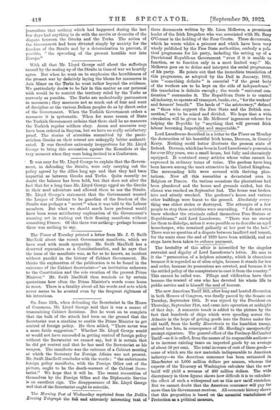The new American Tariff Bill, after long and heated discussion
in both Houses of Congress, was finally passed by the Senate on Tuesday, September 19th. It was signed by the President on Thursday, September 21st, and came into operation at midnight of that day. A romantic touch is added to the picture by the fact that hundreds of ships which were speeding across the Atlantic in the hope of getting goods into the States under the old tariff, from the lordly .Mauretania to the humblest tramp, arrived too late, in consequence of Mr. Harding's unexpectedly prompt signature. The general effect of the Fordney-MeCumber Tariff—as it is called, from the names of its responsible authors— is to increase existing taxes on imported goods by an average of about 50 per cent. The total increase of cost of these goods— some of which are the raw materials indispensable to American industry—to the American consumer has been estimated in Manchester at 3,000 million dollars per annum, whereas the experts of the Treasury at Washington calculate that the new tariff will yield a revenue of 400 million dollars. The wide discrepancy in these figures shows how difficult it is to calculate the effect of such a widespread net as this new tariff stretches. But we cannot doubt that the American consumer will pay far more than his Government receives. All economic) history shows that this proposition is based on the mantis' wastefulness of Protection as a political measure,


































 Previous page
Previous page